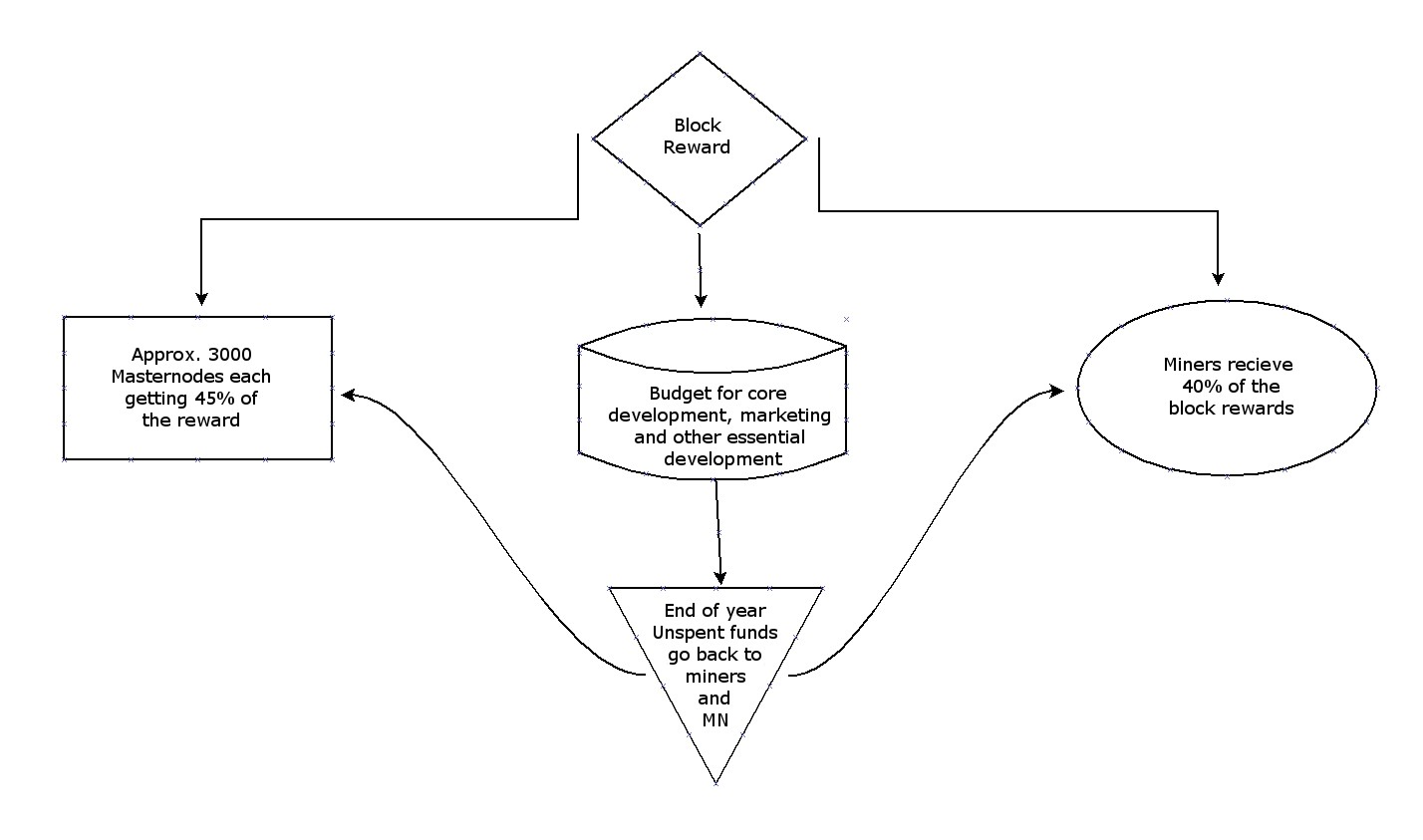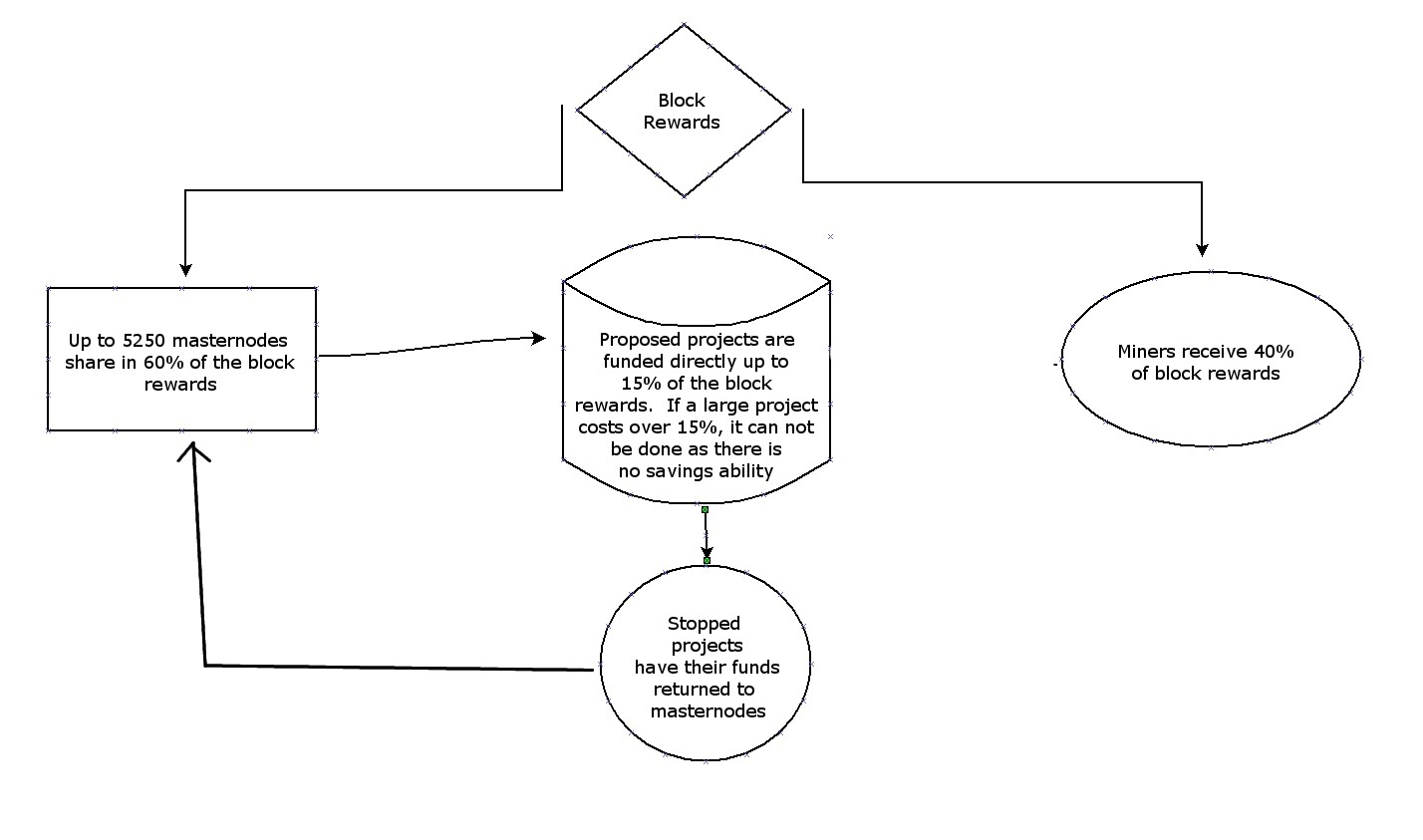Hi, I want to just be sure you all understand what I'm trying to say

So I'm going to try with a little diagram. In truth, I don't like the pay as you choose model because it will likely infringe on
my rewards, reducing my ROI by causing more MN owners to shortsightedly create too many masternodes, reducing everyone's ROI. Please let me explain.
Diagram 1 is my proposal:
In this example, masternode owners can be relatively certain of their ROI because their block rewards do not change. This way, only so many masternodes will be created as makes sense. Say the market thinks a 15% per year reward is good, maybe more, maybe less. Lets say those numbers land us at 3000 masternodes, and it stays there nice and steady because there are no fluctuations in the rewards.
Now at the end of the year, if the funding was not used up, the funds go back to the miners and masternodes equally. This can be distributed evenly if a portion of the excess is distributed with each block reward over the next year. The Masternodes would increase, undoubtedly, due to the increase in rewards until you hit that balance again, and the miner's hash rate would undoubtedly increase as more miners come in to mine as the rewards have increased.
In the end, Masternode owners can always expect a certain ROI, knowing that they will be able to pay their servers and still have a small profit at the end.
There is another big advantage to this funding system. It allows for savings. If there is a big project that the community wants to do, but it requires a large amount of funds, over 15%, funds could be put aside for it, and the project can eventually be achieved. Without an ability to save, this can not be done. Or else, large accounts must be entrusted with trusted people who may fail us.
Low varience
Stability
ability to plan
These are the major positives of this system. I'm sure it could be refined, but even kept as simple as this model makes it, it would work. Simple and eloquent.
The basic other proposal:
In this diagram, the masternode owners will recieve 60% of the block rewards. This will likely increase the masternodes until they feel they have an acceptable ROI, if all things were equal, we would have about 5250 masternodes with 60% of the rewards. Now, a project comes up, and it's funded at 2%, another is funded at 5% and yet another at 8% and so on until we hit the 15% limit. The masternodes, if they haven't already, are freaking out because it costs them too much to run their masternodes and they're losing money, but they have worked so hard for their masternode, nobody wants to stop them, so they all eek out, maybe enough to pay their servers.
Or, the masternode count rises and falls along with the block rewards given out. This would create a lot of volatility in service. With this much chaos, and nobody able to make enough ROI, they stop funding things. Yes, I can see it happen. And once you have that many people who struggled to get their masternodes, it'll be hard to get them to turn them off.
Now, lets say that there is an idea for a big project that would require more than 15% of the rewards. There is no savings. What would you do? Pay the project until THEY save up enough money to do it? You'd trust them? What if they (likely) run off with the funds before it starts? Who else would you like to trust the funds to? Without a DAO, you got nuthin.
Finally, the fact that you can't save at all reduces your ability to make future plans. It ties your hands.
Personally, I reject the idea that Masternode owners will vote for anything if the funds are there. Sure, if the funds are returned a year later, there is no big incentive to recycle the funds back to MN and Miners, but there is no incentive to burn up funds either.
I hope some of you can understand now the advantages of the first proposal. I honestly don't think the second proposal is stable and I suspect people think they will be able to keep more of the funds for themselves, but that surely won't be the case. Instead, you will trade it off for volatility and probably lower income. And this is why I don't like it, because I want stability and a decent rate of return on my investment. Because I am selfish!!!
Edit: Pictures were reversed, fixed
Edit 2: There was a line in the diagram that didn't belong there, fixed


